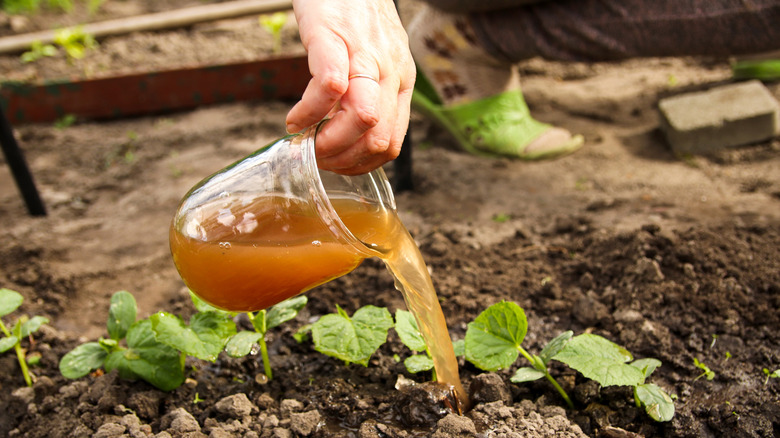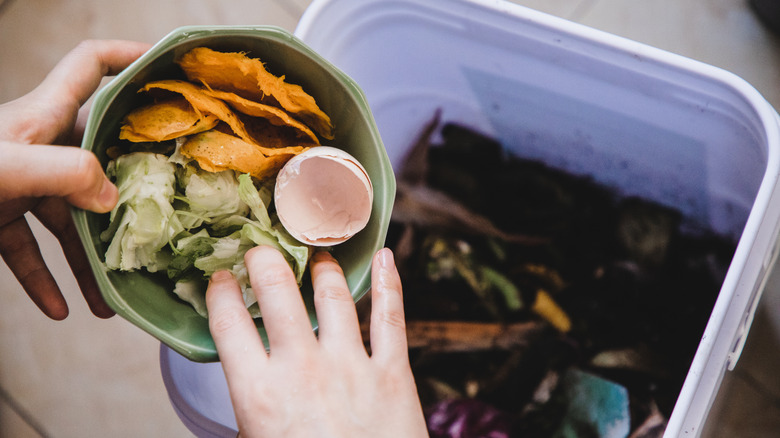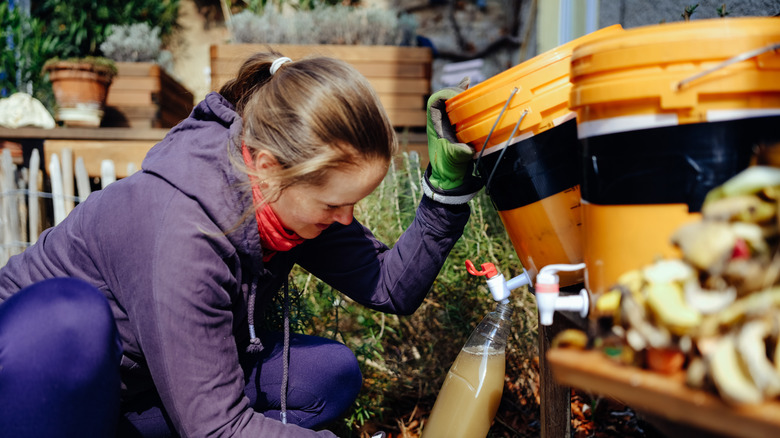One Gross Thing From Your Kitchen Actually Makes The Best Fertilizer
There's a simple Pine-Sol hack that will help rid your trash can of smelly odors, but there's an even better way to stop the stink in the first place: keep food scraps out of the bin entirely. Veggie peels, coffee grounds, and leftovers may seem like waste, but with the Bokashi method, you can transform them into nutrients for your garden. It's incredibly simple to get started — all you need is a bucket, some bran, and a little patience to start producing Bokashi tea, a fertilizer often referred to as liquid gold for plants.
This Japanese method of pickling food waste in an airtight container differs from traditional composting in that it's an anaerobic process, making it closer to sauerkraut than soil-making at this stage. It comes with two distinct perks. First, unlike most compost systems, it can handle meat and dairy. And secondly, it has almost no odor (vinegar-like at most), which means it's also less pest-attracting than compost. Along with reusing those kitchen scraps in the garden as a natural fertilizer, you're also preventing them from producing methane as they rot in the landfill. Best of all, it's easier than most composting systems.
How Bokashi works (and how to use it at home)
Start by collecting the kitchen scraps you'd normally put in the trash and place them in an airtight Bokashi bucket (which has a drain section at the bottom and a tap to access the tea). Sprinkle a layer of inoculated Bokashi bran over each addition and then press down firmly to reseal the lid. The microbes that power Bokashi prefer an airtight environment, so try to limit how often you open the bucket. A handy approach is to gather scraps in a countertop container during the day and transfer them into the Bokashi bin all at once. You could also store your kitchen scraps in the freezer until you're ready to add them to the bin. This won't harm the process, but the scraps should be thawed before layering them in.
Once you've filled the bucket, you'll need to leave it for 14 days or so to allow it to mature into a pre-compost state. This is why it's recommended to have two buckets that you can work in relays. The good news is that you don't need to wait nearly as long for that liquid gold we mentioned earlier. Bokashi tea will be on tap within a few days, depending on what you've added to the bucket. It's important to drain your tea at least every couple of days to prevent it from going off, as well as to keep your bucket contents from getting too wet. It's also best to use it within a few hours of harvesting for maximum benefit.
The benefits of Bokashi in your garden and home
The fermented solids can be buried in soil or added to a compost pile to enrich it with nutrients and organic matter, giving your gardening efforts a welcome boost. Bokashi tea is essentially a liquid fertilizer; however, it's extremely acidic, so it must first be diluted. A common ratio is 1 part tea to 100 parts water, but for sensitive plants, a 200 to 1 ratio is advised. Once diluted, you can apply it directly to garden soil or spray it on your lawn. In its undiluted form, it can even be used to help unblock slow drains.
If you live in an apartment with a balcony garden or if you don't have a compost heap, you can always create a soil factory to take advantage of the gross goodness in your bucket. Simply mix the fermented Bokashi with garden soil, potting soil, or compost in a bag or container to create living soil. The system is super low-maintenance and requires only minimal effort for maximum results. Plus, there's the environmental impact. Bokashi preserves nutrients better than composting and reduces methane from landfill-bound food waste. With your Bokashi tea on tap, all that's left to do is unlock your garden's potential with the best time to fertilize plants.


